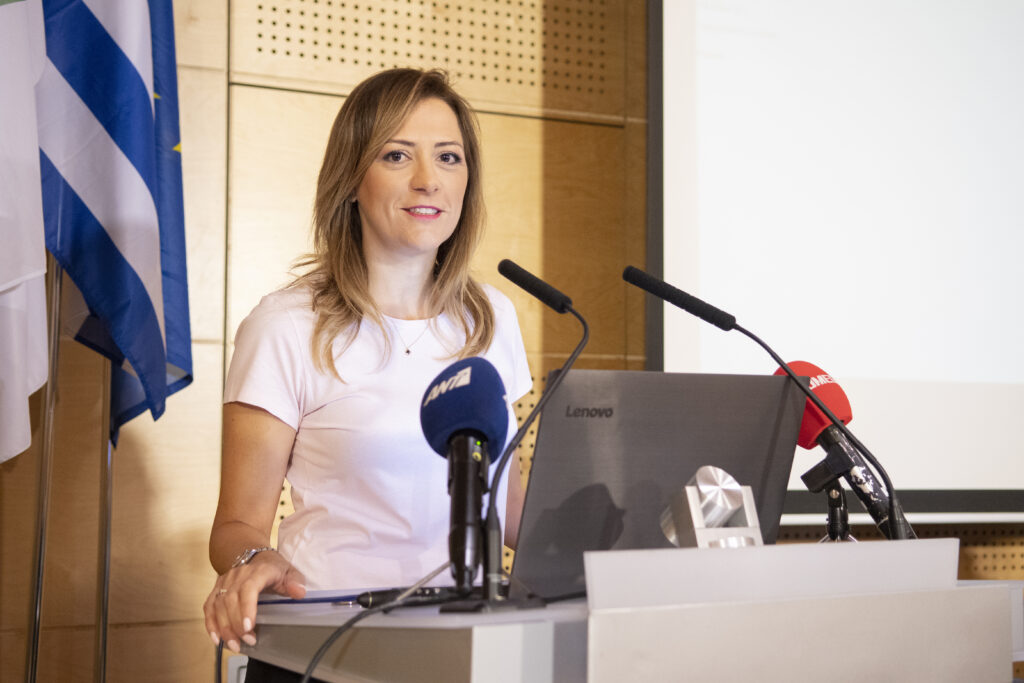Filenews 9 June 2024 - by Fanis Makrides
The Cyprus Police is in full swing to acquire state-of-the-art weapons in the battle to safeguard public safety, utilizing European funds. It is a modernization implemented through participation in funded or co-funded projects and has the ultimate goal of making the Police Corps more effective in its work.
Suffice it to note that the Cyprus Police is currently in contact with a security force of a European country, in an effort to implement a project that will even allow the discovery of bodies buried in wooded areas.
And if that doesn't say much for the sceptical, there are particularly demanding projects that have already been successfully implemented. The cooperation with the Hellenic Police is indicative, thanks to which migratory flows in the sea area between Greece and Cyprus can be detected in a timely manner without physical presence. This is made possible through drones and the development of a mechanism that allows understanding and coordination between the two member states.
A product of these efforts to utilize European funds in order to strengthen the Cyprus Police is the recent purchase of three vessels already operating off the coast of Cyprus on behalf of the Port and Maritime Police.
In addition, some years ago, as part of the same efforts, the Police Force gained access to a European platform for exchanging biometric data of persons with other member states. Only a few days after the implementation of the system, the Police managed to identify the European perpetrator of the robbery in Limassol, take immediate action, locate him in another member state and finally solve the case.
This House is currently negotiating in order to secure funds for the implementation of a new identical system of biometric identifiers for citizens of third countries, i.e. persons from states outside the European Union. This system is expected to be a powerful weapon in the hands of the Police, which is called upon to handle asylum seekers, for whom there are no prospects of personal identification.
All this effort to equip the Police technologically is not limited to safeguarding public safety, as we will see in the following lines. Through these programs, digital modernization is attempted, aiming at the best possible operation of the Police Force, but also the service of citizens.
€10 million in 17 months
The aforementioned projects have been secured and managed by the Finance Department of the Cyprus Police in recent years. Suffice it to note that from January 2021 until May 2022, the competent department of the Finance Directorate secured more than €10 million from various European programs and financial support mechanisms of the European Union.

Digital project DIGIPOL
The implementation of the Digipol project has already begun and for the Cyprus Police it is characterized as very important in efforts to avoid time-consuming bureaucratic procedures, but mainly to serve citizens to the best possible extent.
Digipol is about the digitalization of procedures and services provided by the Police to the public. With the main aim of facilitating citizens' daily lives and their safety, the Police will offer contactless procedures to citizens through digital technologies, aiming to better carry out tasks that concern citizens. Internally, the Police will maximize the potential of its human resources by reducing the administrative cost of transactions with citizens, but also by improving procedures aimed at cleaning up bureaucracy.
This project concerns the creation of the "Digipol" Portal, through which the main police procedures can be carried out by the citizen digitally and contactless.
The citizen will be able to log in to GOV.CY Portal and submit his request, which will be forwarded through the Portal to the Police system, in order to process and send / process the request as automatically as possible. During the processing of the request, the citizen will receive feedback on the progress of the processing of his request.
The DIGIPOL project includes several implementation stages concerning:
>> The creation of the DIGIPOL Portal as software.
>> The interconnection of applications of the existing Police system on the new Gate.
>> The creation of new applications for managing citizens' requests internally in the existing Police system.
>> The application interfaces on the Portal.
>> The supply of computer equipment for the creation of a Public Zone (to support the DIGIPOL software).
>> The creation of a pilot Portal with certain applications for training and information purposes internal to the Police.
>> The training of citizens about the new system and its operation.
>> The training of Police officers for the new system and the new procedures that arise.
>> Informing the public and managing transactions as well as feedback on citizens' experiences.
The project started to be implemented in June 2021 and is expected to be completed in April 2026. The cost of its implementation amounts to €8 million. It is funded by the EU Recovery and Resilience Facility under the Cyprus Recovery and Resilience Plan and is monitored by the Deputy Ministry of Research, Innovation and Digital Policy very strictly through external consultants.

Cyprus-Greece drone shield
The Cyprus Police together with the Hellenic Police participate in the project "PROTECDOME: PROTECtion DOME for public spaces against rogue drones". The PROTECTDOME project aims to develop a unified Anti-Drone System – Counter Unmanned Aerial System (CUAS). The aim of the project is to identify any threats, develop risk and vulnerability analysis methodologies, introduce new CUAS solutions, conduct field exercises and develop training materials that can be used by security stakeholders to improve their own capacity.
Upon completion of the project, Law Enforcement Authorities, Hellenic Police and Cyprus Police will be able to perceive threats from unmanned aerial systems and take relevant counter-measures (non-cooperating drone threats and the counter-measures), which will enhance the protection of public spaces as well as Critical Infrastructure.
Partners:
>> Cyprus Police (Lead Partner)
>> Ministry of Citizen Protection (Y.D.E.A.P. & Hellenic Police)
>> Intelligent Network Systems Technology Research Center "KIOS" – University of Cyprus
>> Centre for Research and Technology Hellas (CERTH)
The project will last for 36 months and its implementation started on May 2, 2024 (end date: 01/05/2027). The cost of the project for the Cyprus Police amounts to € 543,888.89. The total cost is €1,110,998.00 and is co-funded by the European Union at a rate of 90%.

CERETAB and REACTION to monitor the EU's southeastern border
Cyprus and Greece can be proud of the successful implementation of the CERETAB project, thanks to which they safeguard the security of the southeastern "border" of the European Union. CERETAB allows monitoring migratory flows and identifying any threat. The exchange of an accurate picture of the situation at the maritime border between Greece and Cyprus (transboundary sea area extending to approximately 200 km) enhances cooperation and exchange of information through the National Coordination Centres of the two states. More specifically, the project developed a Common Information Exchange Platform, through which it is possible to exchange information in a live environment through the cameras on board the drones. For the project, the two police forces completed the procurement of two state-of-the-art Unmanned Aerial Systems, which are actively used for border surveillance and threat detection at sea borders.

The success of this project and the usefulness of unmanned means for the purpose of monitoring migration flows, led the Hellenic Police and the Cyprus Police to submit a new project and with the approval of the European Union received funding for the REACTION project, which aims to continue cooperation and procure a new Unmanned System.

Border surveillance
The REACTION project aims to continue CERETAB's effort for unmanned operations in the cross-border area between Greece and Cyprus. The project integrates, validates and demonstrates a fully functional, next-generation, holistic border surveillance and awareness platform, while providing pre-border situational awareness beyond remote areas, making it an effective means for early detection of critical situations.
The REACTION project will be interconnected with the already installed information platforms in the Reception & Identification Centers (RIC) and Fylakio of Evros in Greece. In addition, it will be connected to the National Coordination Centre of the Port and Maritime Police of Cyprus for preventive actions.
In addition, it will exploit application-specific algorithms and a new mapping platform to leverage the large amount of data collected by law enforcement authorities (LEAs) through heterogeneous sensors (including optical, thermal and multispectral cameras, LIDAR, etc.) and turn this data into useful information to enhance border surveillance and improve emergency response.
>> Project name – REACTION (REal-time ArtifiCial InTellIgence for BOrders Surveillance via RPAS data aNalytics to support Law Enforcement Agencies).
>> Project duration: 27 months
>> Start date: 01/04/2024
>> Expiration Date: 31/10/2025
>> Project cost: €839,283.02
>> EU co-funded: 90%
Partners:
>> Centre of Excellence "KIOS" (Intelligent Systems and Grids Research Centre), Cyprus.
>> Greek Ministry of Migration and Asylum, Greece.
>> Hellenic Police (EL-AS), Greece.
>> Greek Ministry of Citizen Protection/Organization for European and Development Programmes (YDEAP), Greece.
>> Centre for Research and Technology Hellas (CERTH), Greece.
>> National and Kapodistrian University of Athens (NKUA), Greece.
>> University of West Attica (PADA), Greece.
>Center for Security Studies (KE.ME.A.), Greece.
The officer behind the implementation of the projects

The responsibility for the implementation of the programs lies with Police Inspector B, Chryso Angeli, Deputy Director of the Police Finance Department. Since 2007, he joined the Hellenic Police Force as a specialized personnel for financial matters and established an office to take advantage of the funding opportunities offered by the European Union. Since 2020 she has been assigned to an organizational position in the Administration of the Finance Directorate of the Cyprus Police, as Deputy Director focusing on budget management, coordination of public contracts and management of European projects. Through her position, she has proposed the design of strategic and policy projects on issues such as restructuring and reorganization for the digitalization of processes, the construction of a National Coordination Center, the supply of mobile command stations, the restructuring of Police departments and services in order to combat corruption and has coordinated the implementation of a large number of projects. It participated in dozens of new actions concerning the upgrading of systems and equipment for border control, crime prevention and fighting, cybercrime, combating sports manipulation, human rights and victim protection, specialized training of Police personnel and the supply of equipment to sea and flight means. Ms. Angeli holds a BA and MSc in European Studies from the London School of Economics and speaks French and Spanish.
In her statement to "F", Superintendent B ́ Chryso Angeli, spoke of a great effort being made to secure funding and implementation of these projects. He hastened to add, however, that these strenuous efforts have a corresponding impact, since, as he explained, there is "a net benefit for the citizen".
Horizon – Europe research projects
Horizon Europe research projects focus on research into new technologies and applications. Having experience in managing such projects, the Cyprus Police has already participated in projects as an end-user in the implementation of new technologies for the biometric data of persons in official documents (iMARS project) and in new technologies at airports for terrorist incident prevention purposes (METICOS and DARLENE projects).
Among the new proposals under consideration (2024) are the detection of corpses under the ground in wooded areas using unmanned vehicles and the application of special sensors for penetration into the ground.
The No Hate program
In order for police to respond to handling hate crimes, they need to be able to identify discriminated against, the characteristics of discriminatory behaviour and what constitutes a hate crime. Without these basic skills to identify and investigate relevant cases, police cannot ensure justice and protection for victims, gain the trust of communities or contribute to the fair and transparent implementation of national hate crime laws. Hate speech and hate crimes violate victims' fundamental right to dignity and equality. The aim of the project is to build the capacity of police forces to successfully combat hate speech and hate crime in Greece and Cyprus. Two law enforcement agencies, two civil society organisations and two research and education institutions in three countries will work in close cooperation to build the capacity of police forces to successfully combat hate speech and hate crime. The result of this effort will be the development of a comprehensive training curriculum and e-learning platform and the extensive capacity building of six hundred (600) police officers of all ranks and classes on issues related to hate speech and hate crimes.
Exchange of fingerprints and criminal records
Based on European directives, the security forces of all member states exchange information registered in their databases on criminal records, fingerprints and biometrics of convicted persons. These regulations allow for the immediate detection of crimes. The case of solving a major robbery in Limassol a few years ago, just a few days after the implementation of the system for exchanging fingerprints with other member states, causes a sensation. The members of the Cyprus Police, after registering fingerprints from the scene of the robbery in the system and their current processing, immediately established the identification of a European citizen (former convicted in another Member State), which allowed the authorities of the Republic to announce his involvement in a crime. The suspect was eventually located in another member state and eventually extradited to Cyprus where a case was registered with the Court. For the exchange of Criminal Conviction Registers for Third Country Nationals and their Biometric Data, the Police is in the process of negotiating to secure a budget of €440,000 for the implementation of new systems.
